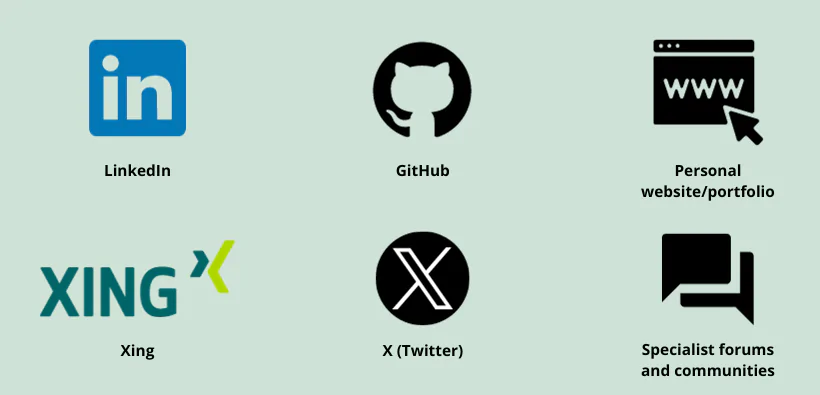In today's digital VUCA-world, large technology companies have become the cornerstones of the economy. The dream of many graduates is to work at one of these big tech companies such as Apple, Google or Amazon. These companies do not only offer competitive salaries and growth opportunities, but also a significant career boost. But how can you land a job at a big tech company? What personal, technical skills and abilities are relevant to be successful?
How to Land a Job in a Big Tech Company
1. Preparation for the application
In general, the largest tech companies like to rely on the knowledge and expertise of specialists. This means that the chances for applicants are great. Before you apply to a big tech company, it's important to prepare well. This includes:
1.1 Personal skills and attributes
First of all, personal qualities such as curiosity, innovativeness, passion, diligence, proactivity and a learning mentality are crucial. These soft skills are just as important as technical skills, as they show how you work and how you fit into the team and the company culture.
- Passion for technology:
A genuine interest in technology and innovation is a crucial factor in gaining a foothold in a tech company. This is not only evident in your academic or career path, but also in your general curiosity and enthusiasm for the industry. Did you have a part-time job in this field during school or university and were you able to gain exciting insights? Great. Mention this in your application. - Self-motivation and initiative:
Large tech companies are looking for candidates who can work independently and take the initiative to tackle new challenges. Creative solutions that demonstrate openness and "thinking outside the box" are also welcome. - Communication skills:
The ability to communicate ideas clearly and concisely is critical to working together effectively in teams and making technical concepts understandable to those outside the field. Communication is also particularly important in interdisciplinary communication. Tech companies often work at the interface of technology, business and design. Communication across disciplines is therefore important in order to create synergies and avoid misunderstandings.
1.2 Technical skills and abilities
Desired technical skills and abilities vary depending on the company and position. It is therefore very important to research the requirements of the advertised or desired position in advance.
Here are some examples of skills that may be relevant in the tech industry.
- Programming skills:
Depending on the position, knowledge of programming languages such as Python, Java, C++, or other relevant languages is essential. These skills can be acquired through academic courses, self-study or internships. - Data analysis:
The ability to analyze data and derive insights from it is of great importance in many tech jobs. This includes knowledge of data mining, machine learning and statistical analysis. - Cloud computing skills:
In today's world, cloud computing skills are invaluable. Big tech companies like Amazon Web Services (AWS) offer extensive training and certifications to deepen your knowledge. - Understanding algorithms and data structures:
The ability to develop efficient algorithms and understand how to best utilize data structures. - Software development:
Knowledge of software engineering practices (e.g. DevOps), including version control (e.g. Git), testing procedures and agile methods (like Scrum or Kanban). - Database management:
Database management skills, including SQL and NoSQL databases. - Machine Learning and Artificial Intelligence:
Basic knowledge of ML and AI principles can be useful for many roles. - Network and Information Security:
Understanding of network topologies, protocols and security practices. - Operating systems and Libraries:
Knowledge of the administration and use of operating systems such as Linux, Windows or macOS or Libraries and Management Methods like ITIL. - Mobile Development:
Skills in developing applications for iOS and Android if the role requires it. - Web development:
Knowledge of frontend and backend development, including frameworks such as React or Node.js. - User Experience (UX)/ User Interface (UI) Design:
Skills in user experience design and evaluation, especially for front-end or product management roles.
2. The application
Once you have prepared yourself sufficiently, it's time to apply. Here are a few steps to consider:
CV and cover letter:
- The CV should clearly and concisely outline all relevant experience, skills and qualifications.
- The cover letter should highlight your motivation, your interest in the company and why you are the right choice for the position.
Online presence:


- LinkedIn:
Make sure your LinkedIn profile and other social media are professionally designed. Big tech companies often research online to find out more about applicants. - GitHub (for developers):
If you are applying for a technical position, a GitHub profile with examples of your work is very useful. - Personal website/portfolio:
Having your own website where you showcase your projects, resume and skills can be very effective. - Xing:
In some countries, such as Germany, Xing is a popular platform for professional networking. - X (Twitter):
A professional X account where you comment on relevant industry topics can also be useful. - Specialist forums and communities:
Active participation in specialist forums or communities, such as Stack Overflow for developers or Behance for designers, can highlight your expertise.
3. The Job Interview
If the application is successful, you will be invited to an interview. Here, it's important to prepare for potential questions and understand the company culture. Many tech companies, including Amazon, have their own interview questions, guidelines and principles to guide employees. One example is the "AWS Leadership Principles" defined by Amazon Web Services.
The AWS Leadership Principles are eight basic principles that guide the behavior and decision-making of AWS employees. These include:
- Customer obsession:
At AWS, the customer comes first. The willingness to meet customer needs and ensure a high level of customer satisfaction is of great importance. - Personal responsibility:
Employees are encouraged to make their own decisions and take responsibility for their actions. - Invent and simplify:
AWS encourages a spirit of innovation and the ability to simplify complex problems. - Leaders are right, a lot:
Employees are expected to make informed and correct decisions and to defend them. - Learn and be curious:
Employees should constantly learn and remain curious to keep pace with rapidly changing technologies. - Hire and develop the best:
The focus is on selecting the best talent and continuously developing them. - Insist on the highest standards:
Maintaining high quality standards and striving for excellence are important. - Think big:
At AWS, employees are expected to think big and set ambitious goals.
In the interview, applicants should demonstrate how they apply these principles in their work and how they can contribute to the company culture.
4. The Job And the Path to Success
After you get the job at a big tech company, it's important to continuously work on your development because the competition never sleeps and the industry is changing fast. This includes:
- Learning and training:
The tech industry is dynamic, and it's important to constantly stay up to date. Attend regular training courses, conferences and workshops to improve your skills. - Networking:
Build a strong professional network to learn from colleagues and mentors and take advantage of professional opportunities. - Own projects:
Work on your own projects to deepen your expertise and skills. - Adaptability:
Be open to change and adapt to new technologies and requirements. - Time management:
Good time management and the ability to work under pressure are also important.
5. Interesting Facts
In general, women are underrepresented in many of the big tech companies worldwide. If there is a corresponding legal regulation, it can be a chance to be considered as a woman with the same qualifications, especially in management positions, where the proportion of women is only just under a third.
A job at a big tech company requires a mix of technical knowledge, personal skills and a strategic approach to the application process. With commitment, continuous learning and a proactive attitude, this ambitious career path can be successfully pursued. Keep in mind, that this type of job usually requires a very high level of dedication, also at the cost of a private life.
Continue to Learn


